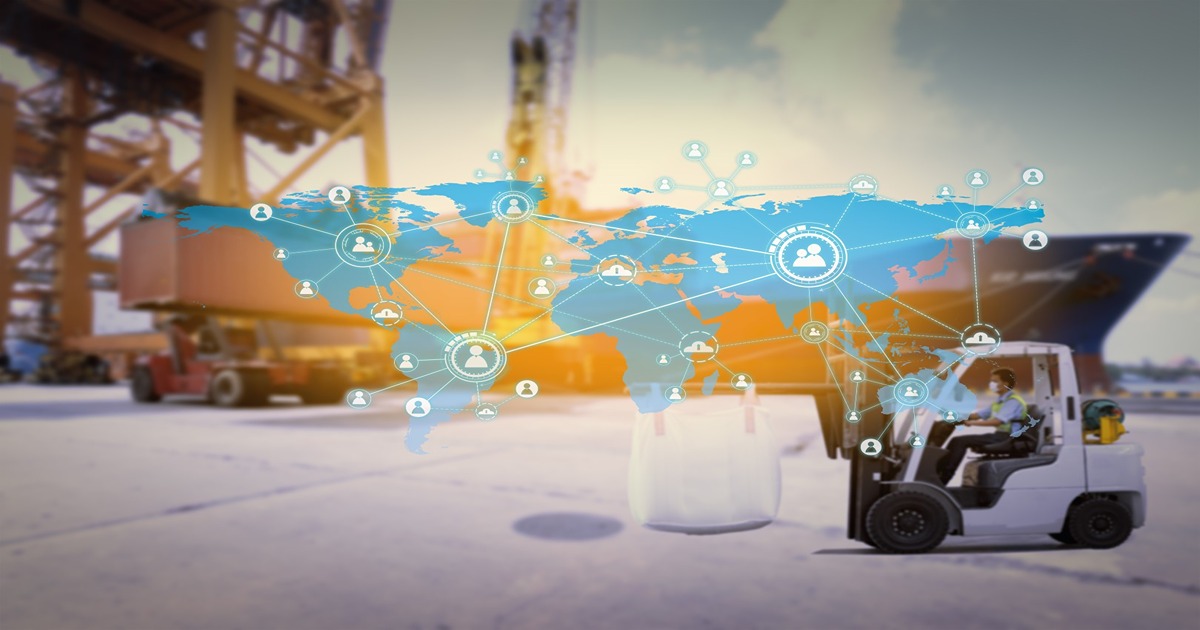
Transportation
Article | April 26, 2023
Efficiency is crucial for B2B supply chain success. Effective supply chain management techniques can streamline operations, reduce costs, and enhance customer satisfaction from planning to delivery.
Contents
1. Strategic Planning to Enhance Supply Chain Optimization
1.1 Roadmap for Developing Supply Chain Optimization
1.2 Integrating Supply Chain Strategy with Business Strategy for ROI Growth
2. Effective Procurement Strategies to Maximise ROI in Supply Chain
2.1 Supplier Relationship Management
2.2 Cost-effective Procurement Processes
2.3 Continuous Improvement and Innovation
2.4 Risk Management and Mitigation
3. Optimizing Supply Chain with Effective Demand Forecasting Techniques
3.1 Anticipate Future Demand
3.2 Overstocking and Understocking Risk Management
3.3 Integrated Forecasting approach between Supply Chain Stakeholders
4. Emerging Technologies for Supply Chain Optimization Leveraged by Enterprises
4.1 AI and ML
4.2 Blockchain Technology
4.3 IoT
4.4 Augmented Reality and Virtual Reality
5. Leading Solution Providers for B2B
6. Conclusion
Optimizing the B2B logistics and supply chain management has become a crucial business strategy to increase efficiency, cut costs, and boost customer satisfaction in the fiercely competitive business environment. With the increasing customer demand, supply chain managers now emphasize on faster, more precise, and unique ways to fulfill orders with enhanced logistics management techniques.
“Companies that optimize their supply chain operations experience a 2.3 times greater EBITDA (earnings before interest, taxes, depreciation, and amortization) than their competitors.”
(Source - A survey by Deloitte in 2020)
Despite the significance of supply chain optimization, it is challenging to keep up with the latest industry trends and best practices due to the dynamic nature of the logistics industry. Learning the value of optimizing the B2B supply chain and how it can assist businesses in keeping up with the ever-growing demands of their customers through planning, strategizing and leveraging technologies helps businesses maintain a competitive advantage and achieve sustainable growth.
1. Strategic Planning to Enhance Supply Chain Optimization
To achieve optimal results, businesses must develop a comprehensive plan outlining their supply chain improvement goals, objectives, and strategies.
1.1 Roadmap for Developing Supply Chain Optimization
Developing a roadmap for supply chain optimization includes reviewing current operations that help in identifying the strengths and weakness of the supply chain management and assist in recognizing the opportunities for improvement, establishing SMART goals and objectives, defining strategies to meet these goals, involve streamlining processes, investing in technology, improving supplier relationships, and engaging customers and actions, as well as ensuring market adaptability to accommodate changing market conditions and evolving customer needs through assessment and adjusting the roadmap.
1.2 Integrating Supply Chain Strategy with Business Strategy for ROI Growth
Integration of the supply chain involves aligning the supply chain objectives with the overall business goals, such as revenue growth, cost reduction, and customer satisfaction. The integration ensures the supply chain operations support the business goals, like cost reduction, customer satisfaction and revenue growth.
"Companies that successfully integrate their supply chain and business strategies can reduce operating costs by 10-15% and increase efficiency by 20-30%.”
(Source - A study by Accenture in 2020)
The alignment further helps track KPIs and data-driven decision-making and continuously improves the supply chain operations to achieve objectives. Furthermore, it assists in better planning, coordination, and execution of supply chain activities, resulting in faster and more accurate fulfillment of customer orders.
2. Effective Procurement Strategies to Maximize ROI in Supply Chain
Procurement strategies can raise productivity in the fast-paced logistics management and supply chain industry by optimizing the supply chain, boosting efficiency, and giving a competitive edge.
2.1 Supplier Relationship Management
Effective supplier relationship management (SRM) can result in more competitive pricing, enhanced product quality, and increased dependability. To accomplish SRM, businesses must identify key suppliers, develop partnerships, communicate effectively to ensure clear expectations and mutual understanding, share information and collaborate to foster innovation and continuous improvement.
2.2 Cost-effective Procurement Processes
Implementing cost-effective procurement procedures can help businesses reduce expenses and enhance productivity. To achieve cost-effectiveness, businesses should streamline operations to save time and money, leverage technology to automate processes and improve accuracy and negotiate with suppliers for better pricing and terms.
2.3 Continuous Improvement and Innovation
Continuous improvement and innovation are necessary for logistics and the supply chain to remain competitive. This involves regularly reviewing and updating procurement processes, supporting supplier innovation, and keeping up with procurement and supply chain management technology trends and developments.
2.4 Risk Management and Mitigation
Effective risk management and mitigation strategies are essential to prevent disruptions in the supply chain. To achieve this, businesses should focus on identifying potential risks and developing mitigation strategies, incorporating redundancy into the supply chain to minimize the impact of disruptions, and establishing transparent emergency communication and escalation procedures.
3. Optimizing Supply Chain with Effective Demand Forecasting Techniques
3.1 Anticipate Future Demand
Accurate demand forecasting is crucial for supply chain optimizing done by analyzing real-time supply chain data to identify trends. For demand forecasting, businesses can utilize historical sales data, market trends, and customer feedback. To make accurate forecasts, companies must consider various factors influencing demand, such as seasonality, economic conditions, and shifting customer preferences.
3.2 Overstocking and Understocking Risk Management
Demand forecasting errors can lead to overstocking and understocking in supply chain management. Using demand forecasting rightly can determine the optimal inventory level at any given time to avoid overstocking and understocking. Businesses can predict demand and adjust inventory by analyzing sales data, market trends, and other factors.
3.3 Integrated Forecasting approach between Supply Chain Stakeholders
The integrated forecasting approach entails coordinating data sharing and communication between all supply chain stakeholders, from suppliers to customers. Stakeholder participation in demand forecasting improves accuracy. In addition, each stakeholder has unique knowledge and perspective that can help identify trends and patterns.
4. Emerging Technologies for Supply Chain Optimization Leveraged by Enterprises
4.1 AI and ML
Leading SCM providers do offer regression modeling and causal analysis for demand forecasting. Using AI and ML, the functionality is embedded within the DP module. If a more rigorous and sophisticated approach is desired, it is possible to forecast demand numbers outside the SCM system using sophisticated modeling and then upload them back into the SCM system.
4.2 Blockchain Technology
Blockchain enables secure, transparent, and decentralized transactions. It can be utilized in the supply chain to track the movement of goods, reduce the risk of fraud, and increase supply chain visibility by maintaining an immutable record of every transaction.
4.3 IoT
To monitor humidity, temperature control, and other environmental factors that affect the quality of products while in transit. IoT helps businesses enhance supply chain visibility, reduce product spoilage risk, and enhance customer satisfaction using modern temperature control technology.
4.4 Augmented Reality and Virtual Reality
AR and VR technologies are transforming the supply chain by improving the accuracy of inventory management, reducing errors, and enhancing the training of employees. In addition, its tools can be used to create digital representations of warehouses, products, and equipment, allowing employees to visualize the supply chain and identify areas for improvement.
5. Leading Solution Providers for B2B
Several leading B2B companies have been identified based on research for supply chain optimization. To optimize supply chains, these companies have demonstrated a commitment to strategic planning, effective procurement strategies, and demand forecasting techniques. The solution providers also recognize the significance of managing risks associated with overstocking and understocking and have implemented integrated forecasting approaches with their supply chain partners and customers. In addition, these companies use emerging technologies such as augmented reality, virtual reality, cloud technology, machine learning and AI, blockchain technology, and the IoT to improve their supply chain operations. By prioritizing supply chain optimization, the following B2B companies gain a competitive advantage within logistics and supply chain industries and provide exceptional customer experiences.
Coupa Software
The supply management solutions offered by Coupa Software are hosted in the cloud and make use of machine learning and artificial intelligence to provide businesses with insights that can be used for data-driven decision-making.It assists businesses in tracking the performance of their supply chains compared to key performance indicators, identifying areas in which advancements can be made, and taking action to optimize their supply chain operations.
Stord
Stord a platform provider, offers a suite of software solutions that improve supply chain management for businesses. Its warehousing, transport, and inventory management solutions are integrated into a single platform. As a result, Stord offers companies greater visibility and control over their supply chains, allowing them to make more informed decisions and optimize operations by combining these functions into a single platform.
Roambee
Roambee is an artificial intelligence (AI)-powered platform that provides improved supply chain and visibility solutions for real-time, on-demand, and end-to-end data. Using cloud data analytics and automation, it assists in monitoring shipments, inventories, and returnable assets to provide dependable and responsive monitoring solutions. The result is a return on investment (ROI) of 4X or more on the supply chain assets by optimizing inventory levels and utilization.
FlowSpace
FlowSpace offers cloud-based supply chain solutions. With an internet connection, businesses can access real-time inventory, orders, and shipments from anywhere. Its solutions optimize inventory and demand fulfillment with machine learning and predictive analytics. In addition, IoT sensors and beacons provide accurate warehouse operations data for the company. FlowSpace uses cutting-edge technology to provide efficient and effective supply chain solutions.
OPTEL Group
OPTEL Group's cutting-edge traceability solutions help businesses optimize their supply chain. These solutions permit businesses to track their products and materials throughout the supply chain, from production to distribution. It's traceability solutions provide businesses with real-time visibility into their supply chain operations by utilizing advanced data capture technologies such as barcode scanning, RFID, and serialization. This allows them to identify potential bottlenecks, optimize workflows, and decrease waste and inefficiency.
Blue Ridge
Blue Ridge,a provider of cloud-based supply chain solutions, has developed a suite of solutions that make use of machine learning and artificial intelligence to improve the accuracy of forecasts, reduce the costs associated with inventory, and increase company's profitability. It does this by providing businesses with flexible and scalable solutions, as well as ones that can be adapted to meet the particular requirements of each business.
GMDH Streamline
GMDH Streamline makes use of complex algorithms to perform data analysis and provide insights that, when implemented in B2B logistics operations, can lead to increased efficiency and a reduction in costs. This software can analyze past sales data and make predictions about future demand patterns, which helps to ensure that the right products are always available for purchase. Because of this, there will be less of a need for excessive stockpiling, which can prevent the free flow of capital and raise the risk of stock obsolescence.
Netstock
Netstock's cloud-based solutions provide businesses the agility and responsiveness they need to stay competitive in the ever-changing business landscape. With its seamless integration with industry-leading ERPs, Netstock unlocks valuable ERP data and enables businesses to make informed decisions based on enhanced analytics. In addition, by leveraging Netstock's solutions, businesses can respond swiftly to supply and demand fluctuations, resulting in optimized logistics and efficient supply chain management.
Solvoyo
With Solvoyo's platform, businesses can optimize their supply chain performance, reduce inefficiencies, and achieve cost savings. In addition, the platform offers advanced scenario modeling and real-time analytics to help companies to make informed decisions and quickly adapt to changing market conditions. By leveraging Solvoyo's capabilities, businesses can achieve a competitive advantage and drive growth in the dynamic world of supply chain management.
American Software, Inc.
American Software provides logistics and supply chain companies with supply chain management software solutions. Its solutions including supply chain planning, warehouse management, transportation management, global trade management, and vendor inventory management are intended to assist businesses in optimizing their B2B logistics operations, increasing their efficiency, and lowering their expenses. In addition, it provides modern temperature control technology to ensure safe and efficient transport of temperature-sensitive goods in the supply chain.
6. Conclusion
“The global supply chain management market size is expected to reach USD 37.4 billion at a CAGR of 11.3% by 2027."
(Source - Grand View Research)
The anticipated growth of the global supply chain management market presents businesses with opportunities to enhance their supply chain operations by implementing innovative technologies and strategies. The increase in market size indicates a growing demand for efficient supply chain management solutions that reduce costs, optimize efficiency, and improve customer satisfaction. Businesses can use AI, blockchain, and augmented reality to analyze real-time data, forecast demand, and streamline procurement. These technologies and strategies can give logistics and supply chain management businesses an edge in the increasingly competitive marketplace.
Read More

Warehousing and Distribution
Article | July 17, 2023
With half a million people benefited in 60+ countries, the Tomorrow Rising Fund is now focusing on education and professional training programs to secure the best future for young people and their communities affected by COVID-19.
Two months after launching the Tomorrow Rising fund to support Covid-19 emergency relief in April 2020, Schneider Electric’s Foundation moves forward to support recovery and resiliency through education and training programs.
The Tomorrow Rising Fund was launched to support emergency and longer-term reconstruction related to Covid-19 in all the countries where Schneider Electric operates. The Schneider Electric Foundation appealed to its leaders and employees to get involved and all their donations have been matched by the Group. Other external stakeholders and partners have also contributed.
Read More

Warehousing and Distribution
Article | June 27, 2023
Autonomous robots have transitioned from a futuristic system that only a few enterprises could afford to a sustainable, well-established solution in a wide assortment of warehouse automation projects in recent years.
With the flourishing transportation and logistics industry and increasing e-commerce penetration worldwide, innovative technologies are revealing promising opportunities throughout the supply chain.
Warehouse Automation: Driving Value in the Supply Chain
Historically, autonomous robots have been used to perform tedious and repetitive tasks, necessitating sophisticated programming for setup and incorporation while lacking the dexterity to easily adjust operations.
As autonomous robots become more intelligent, their setup times decrease, they need less monitoring, and they are able to work alongside their human counterparts. The benefits for the future supply chain are increasing as autonomous robots become more capable of working day and night with more consistent levels of productivity and quality and performing tasks that individuals should not, cannot, or do not want to do.
Autonomous robots drive advancements and add value to the supply chain, primarily by increasing revenue potential and lowering direct and indirect operating costs. Autonomous robots, in particular, can assist:
Boost efficiency and productivity.
Lower risk, error frequency, and rework rates.
Enhance employee safety in high-risk workplaces.
Handle low-value, routine tasks so people can work together on strategic projects that can't be done by machines.
Raise revenue by optimizing order fulfillment rates, and delivery speed, and, ultimately, increasing customer satisfaction.
Sneak Peek into the Future of Autonomous Robot
Autonomous robots are expected to witness strong growth in the coming years. These robots will become more common in the future supply chain as technology advances, allowing them to operate with more human-like abilities. Improvements in haptic sensors, for example, will enable these robots to grasp objects varying from multi-surfaced metal assembly parts to fragile eggshells without requiring changes to robotic components or programming. This will encourage companies operating in the industry to increase their research and development activities and introduce innovative and advanced supply chain technologies.
Read More

Supply Chain
Article | November 11, 2022
The complexity of today’s supply chain has resulted in a highly fragmented supply chain ecosystem. Whether it is a global pandemic or an ongoing war, streamlining the moving parts in the supply chain management system is an immense feat in the current climate. The resulting shortage of materials, disruption of transportation, and delays have complicated the supply chain even further. Add to it the expectation to minimize expenses, optimize inventory, and enable quality and customer expectations, and stakeholders at every level of the supply chain are inundated with challenges.
This is where using advanced analytics in supply chain can be a game changer for many manufacturers. It can help them gain a deeper insight into their operations and how the supply chain is moving.
How Supply Chain Analytics Enriches Supply Chain Management
A 360-degree view of the supply chain is crucial for supply chain leaders. A lack of insight can cause costly delays and avoidable disruptions. Obtaining complete visibility in supply chain management, on the other hand, can be difficult. The immense volume of data that many organizations have to deal with makes it difficult to gain proper insight.
Supply chain analytics tools help in gaining a better sense of the aggregated data from different parts of the supply chain, such as procurement, ERP in supply chain management, warehousing management, shipping and logistics management, and many more. The more accurate the data is, the simpler it is to use advanced supply chain management analytics to forecast, predict, and plan better in order to maximize the supply chain’s capabilities.
Optimizing the Supply Chain: 3 Ways to Do so with Analytics
With the range of analytics applications in supply chain in use today, manufacturers have the opportunity to completely transform how to view, manage and strategize. Here are five data analytics supply chain tools to consider in the pursuit of optimization.
Demand Forecasting
Inventory management is at the heart of supply chain optimization. Not calibrating the inventory stock based on demand and supply for bestselling products and those that don’t move fast can cause either an overstocking or understocking problem. Either way, forecasting the right balance is difficult to achieve, but data analytics can make it simpler. The lack of the right products in stock can heavily impact the bottom line. According to a survey by Logility, 36% of supply chain experts consider inventory optimization the primary reason for adopting analytics. An integrated mapping of retail sales, inventory levels, and the flow of goods will lead to accurate demand forecasting.
This data can empower organizations to:
Strategize sales promotions
Define product pricing
Maximize budgets
Predict accurate inventory levels
Inventory management has a cascading effect on the supply chain, and advanced demand forecasting has helped many organizations achieve an optimum level of inventory for the right products.
Predictive Warehousing Maintenance
Machine Learning (ML), artificial intelligence (AI), and the Internet of Things (IoT) have been emerging technologies on the supply chain management landscape. By using a mix of these technologies, it is possible for manufacturers to deploy predictive maintenance in warehousing. Predictive maintenance is the process of assessing data generated from the past and in real-time to determine patterns and identify equipment failure and maintenance schedule before a breakdown occurs.
This helps manufacturers to:
Avoid heavy repair costs
Plan spare part supply
Slash downtime from equipment failure
Eliminate production delays
In addition to reducing production bottlenecks, predictive maintenance gives businesses the ability to manage their equipment and optimize their shelf-life.
Warehousing Efficiency
At the warehouse phase of the supply chain, analytics can help manage the supply chain in more than just one way. The warehouse workflow is just as crucial, as it facilitates a clear view of the condition of goods as well as the optimization of the warehouse space. In addition to warehouse space maximization, quality control is another challenge that warehousing management addresses.
Supply chain analytics can enhance warehousing efficiency by:
Ensuring the correct storage of goods based on their weight, fragility, and perishability
Aligning with resource management like equipment, vehicles
Identifying disruptions to storage before they occur
One of the advantages of supply chain analytics is getting a deep insight into the warehouse’s operation so manufacturers can identify gaps and take steps to make it more efficient.
Transportation Tracking
Real-time analytics of transportation and logistics is a crucial piece in the puzzle of supply chain management. For example, the data generated in relation to fuel consumption, weather conditions, and even traffic patterns can help organizations boost their logistics and carrier management.
It can help them to:
Schedule deliveries
Determine better routes
Evaluate current routes
Strategize their shipping schedule
To Wrap it Up
To put it simply, a deep insight into the supply chain, inventory management, and warehouse operations is a great way to ensure the supply chain is on track. Effective supply chain management software is an asset for an organization when it is able to leverage the insights and make well-informed strategies to further optimize the supply chain.
Read More